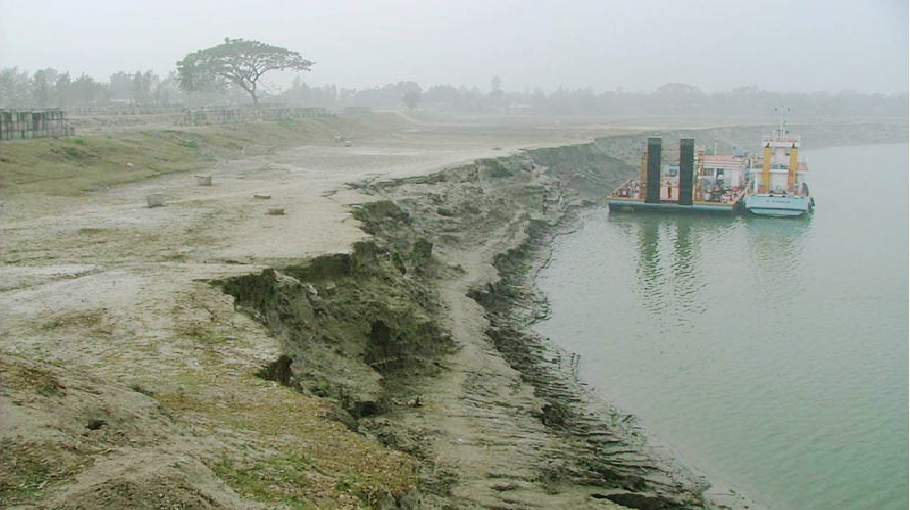Enforcement of river protection laws in Bangladesh

Bangladesh being a riverine nation is an abode for more than 800 rivers that collectively creates the most sophisticated river system in the world. These rivers scattered across the country are contributing immensely to the Bangla riparian rural life, ecosystem, transportation, agriculture and national economy for centuries. Estimate shows that more than 60 percent of total population of our country relies on river water and 18 percent drinking water is derived from our rivers, so undeniably the sustainability of our country is heavily reliant on our free flowing rivers. To bolster the protection of our rivers High Court Division (HCD) of the Supreme Court of Bangladesh on February 2019, declared that all rivers would possess “legal entity”. This fictitious entitlement by HCD has bestowed rivers the long cherished legal protection.
But sadly due to lack of strict enforcement of river protection laws, rivers of Bangladesh are on the brink of extinction. Recently a 22 km river “Mayur” situated in Khulna which is the largest fresh water carrier in the said district is now awaiting slow demise due to rapid urbanization, frequent pollution and unauthorized encroachment. Other major rivers such as Korotoa, Teesta, Rupsha, Pashur and Padma, Karnaphuli are now envisaged to be in critical condition due to incessant pollution. Such major pollutants of rivers are generally two folded one is waste discharging and two is Illegal River grabbing.
According to one projection given by the Environment and Social Development Organization (ESDO) in March this year, three major rivers, Padma, Meghna, and Jamuna, transport 73,000 tons of plastic trash daily to the Bay of Bengal whereas Bangladesh generates 3,000 tons of plastic waste each day. The Shitalakhya river is decaying rapidly due to hundreds of industries including garment, dyeing, polythene, fertilizers, pesticides dump toxic wastes into river beds. Due to lack of proper drainage system such wastes ultimately ends up in the rivers which seriously damage the river bio-diversity. But unfortunately no preventive measures have been adopted to mitigate such occurrences.
Another lethal killer of rivers are unauthorized river grabbers. They illegally through adverse possession grasp river surroundings and conduct industrial activities without paying any heed to local administration and concerning laws. Although the Government showed strong commitment towards eviction of such scrupulous land grabbers. So far National River Conservation Commission of Bangladesh (NRCCB) has evicted approximately 20,000 land encroachers but 65,000 more are still freely preying on the rivers. In order to safeguard the vulnerable rivers and ensure water security, we need time-tailored river protection enactments to secure ecological balance of rivers.
HCD in its writ petition verdict on 2019 has assigned the National River Conservation Commission (NRCC) as the guardian of all rivers. So to uphold apex court’s commitment, NRCC needs to amend the existing drawbacks of the “National River Protection Commission Act 2013”. Luckily the government has recently taken stern initiatives to amend the 2013 law and has proposed a new draft of the said act in 2020 which inculcates some laudable changes. Firstly the amending act broadened the scopes of waterways and included all the rivers, reservoirs, canals, seashores, haors, baors, wetlands, reservoirs, fountains, lakes, and all water sources of Bangladesh under the commission’s jurisdiction.
Secondly the draft also proposes to incriminate illegal occupants of rivers, obstruction of river flow, unauthorized infrastructures surrounding river banks and, fish farming. Thirdly by dint of the legal entity status , the rivers under public trust doctrine will be equivalent to legal individuals and the local administration eg LGED, BWDB, BIWTA, BADC have to consult and take NOC (No-Objection Certificates) from the Commission prior to initiating any project involving any rivers . This provision would widen the scope and jurisdiction of NRCC. Fourthly the most promising change is the creation of discrete court called “River Protection Courts” which will adjudge along with co-ordination of mobile court, all cause of action pertaining to river security.
Fifthly about imposition of penalties, the proposed law dictates that the offence of illegal occupation and subsequent violation of the said law will punish the perpetrator with 1-5 years of imprisonment and fine of taka 1 lakh to 1 million moreover the penalty will also include fusion of other criminal laws as well. Such penalties if imposed properly by the court will definitely deter prospective river polluters. Sixthly the commission will have the authority to declare any rivers as “Environmentally Critical Area” (ECA) and would prevent illegal occupation and river pollution and would bolster river ecology.
Finally the section 6(e) of the “Bangladesh Environment Conservation Act 1995” has prohibitory provisions in place which prohibits and incriminates illegal river filling, requires proper implementation. But the said act should include provisions for mitigating waste disposal in waterways which is absent in the said act. So it is evident that strengthening criminal and civil liabilities through relevant laws are indispensable to ensure our river security.
So finally in order to protect and preserve the dying and dilapidating conditions of our precious rivers, holistic approach needs to be conducted. For instance actors of government and industry sectors needs to co-operate, proposed NRCC reforms and autonomy of the commission must be considered and should be implemented as soon as possible, accountability of stakeholders should be ensured, the proposed National Action Plan (NAP) by Government of Bangladesh in the COP-27 should include river security policies, finally widespread awareness among people should be done to make us aware about rivers. In conclusion we have to comprehend that without rivers the sustainability of Sonar Bangla can’t be imagined. So before we see another river withering into extinction it is high time for the Government to solidify policy framework and bolster prompt enforcement of relevant laws to safeguard the dwindling fate of our rivers.
Samiur Rahman is LL.B. (Hons) and LL.M. from Jagannath University




